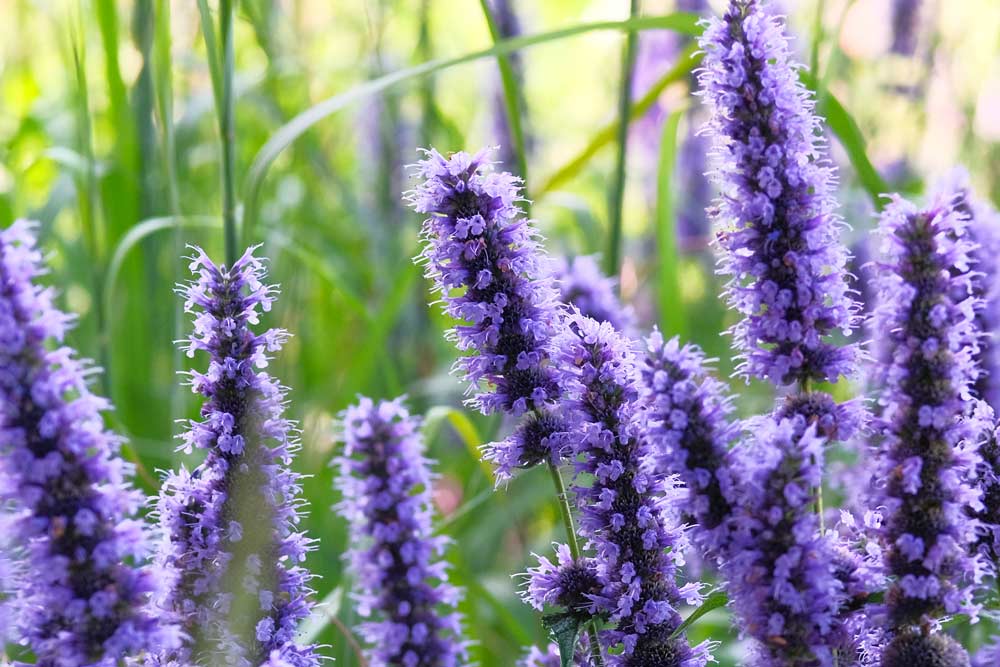Hyssop Essential Oil

Hyssop is used in the treatment of bronchitis, asthma, coughs, and colds. Hyssop may induce heavy sweating with fevers and can increase blood pressure. Hyssop is also used externally for bruises, concussions, and cuts. Hyssop is used for digestive and intestinal problems, including liver and gallbladder conditions, intestinal pain and loss of appetite. Stimulant, carminative, sedative, antispasmodic, diuretic are some of Hyssop Essential Oil's medicinal properties.
Associated with purification, the perennial plant hyssop is native to the Mediterranean region and was considered a holy plant in biblical times. There is a hyssop oil Bible reference — in verse 7 of Psalm 51, it states, “Cleanse me with hyssop, and I will be clean; wash me, and I will be whiter than snow..” For thousands of years, hyssop has been an herb used as a purifier and cleanser.
In the Old Testament, God commanded His people to use hyssop in the ceremonial cleansing of people and houses. Hyssop appears at Jesus’ crucifixion when the Roman soldiers offered Jesus a drink of wine vinegar on a sponge at the end of a stalk of hyssop.
Health Benefits of Hyssop Essential Oil
Its medicinal properties include the following health benefits: treat muscle aches, spasms, and cramps, kill bacteria, natural treatment for arthritis, boost immune system, improve digestion, improve digestion, kill parasites, clear gas, heal scars, and improve metabolism.
Antispasmodic
Hyssop oil’s antispasmodic properties can help treat muscle aches, muscular spasms, and cramps naturally while relieving spasms in the respiratory system, nervous system, muscles, and intestines. The muscle-relaxing properties demonstrated could have effects on not only intestines and coughing but sore muscles, as well.
Antiseptic
When Hyssop is applied to an opening of the skin, it fights infection and kills bacteria. Hyssop may help wounds, cuts, and bruises heal faster.
Antiviral
Hyssop has been demonstrated as effective against herpes simplex viruses in particular, apparently by interacting directly with the viral envelope and disarming it. [1]
Arthritis Treatment
By increasing circulation, hyssop oil and tea inhibit swelling and inflammation, allowing the blood to flow through the body and relieve the pressure that builds up because of clogged arteries.
Boost Immune System
Hyssop improves circulation and digestion, while it kills bacteria and parasites.
Carminative
Hyssop helps clear gases from the intestines and relieves uneasiness, heaviness, indigestion, stomach aches, and nausea. Hyssop stimulates the downward passage of gas for safe expulsion from the body.
Cicatrisant
Deep cuts will heal quicker and the scar marks left by them will disappear sooner if Hyssop oil is applied to them.
Circulation
Because of its anti-rheumatic properties, Hyssop improves and promotes circulation while working as a natural remedy for rheumatism, arthritis, gout, and swelling.
Digestive wellness
Because it is a stimulant, Hyssop oil increases the production of secretions, like bile, digestive enzymes, and acid to break down food as it makes its way to the stomach. This speeds up the decomposition of complex proteins, carbohydrates, and other nutrients. Hyssop helps stimulate your digestive system to ensure better metabolism and nutrient absorption.
Parasites
Because it’s a vermifuge, Hyssop can fight parasites including tapeworm, fleas, hookworms, and flukes.
Stimulant
Hyssop oil may stimulate several systems in your body including the nervous, endocrine, circulatory and excretory systems.
Hyssop properties
The health benefits of Hyssop Essential Oil can be attributed to its properties as an astringent, stimulant, antispasmodic, antirheumatic, antiseptic, carminative, cicatrizant, digestive, diuretic, emmenagogue, expectorant, hypertensive, nervine, sudorific, tonic, febrifuge, vermifuge, and vulnerary substance.
Composition of Hyssop oil
The chief constituents of Hyssop essential oil are Alpha Pinene, Camphene, Beta-Pinene, Sabinene, Myrcene, Limonene, Pinocamphone, Iso-Pinocamphene, Gamma Terpineol, Cineole, and Thujone.
Plant Profile
Hyssop is a member of the Lamiaceae (mint) family, which also includes herbs like mint, rosemary, basil, lavender, sage, and oregano. It is a perennial shrub, tolerant of a wide range of weather and drought conditions.
The Mythology of Hyssop Oil
The Romans used hyssop because they believed it helped protect them against plagues. Hippocrates praised the herb for its ability to relieve respiratory symptoms. Hyssop was used in pagan ceremonies to purify worshippers. In the Middle East, hyssop was used to cleanse and purify temples.
Precautions
While hyssop has many benefits, we are reminded that not all compounds of essential oils are universally safe or beneficial. Essential oils should never be applied directly to your skin. You will first need to dilute hyssop oil with a carrier oil, such as those made from olive, coconut, or jojoba. Don’t use any essential oils near the eyes.
Important Note on Quality
Not all oils are created equal. The purity of an essential oil determines how effective an essential oil can be. Because of a lack of industry standards and a lack of regulation on terms such as "natural" or "pure", much of what you find at the drug store is NOT a therapeutic grade of essential oil and may lack real quality or even contain contaminants or adulterants.
